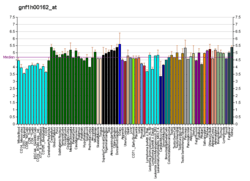Opticin
Opticin is a protein that in humans is encoded by the OPTC gene.[5][6]
Opticin belongs to class III of the small leucine-rich repeat protein (SLRP) family. Members of this family are typically associated with the extracellular matrix. Opticin is present in significant quantities in the vitreous of the eye and also localizes to the cornea, iris, ciliary body, optic nerve, choroid, retina, and fetal liver. Opticin may noncovalently bind collagen fibrils and regulate fibril morphology, spacing, and organization. The opticin gene is mapped to a region of chromosome 1 that is associated with the inherited eye diseases age-related macular degeneration (AMD) and posterior column ataxia with retinosa pigmentosa (AXPC1).[6]
References
Further reading
- Hobby P, Wyatt MK, Gan W, et al. (2000). "Cloning, modeling, and chromosomal localization for a small leucine-rich repeat proteoglycan (SLRP) family member expressed in human eye.". Mol. Vis. 6: 72–8. PMID 10837509.
- Friedman JS, Ducharme R, Raymond V, Walter MA (2000). "Isolation of a novel iris-specific and leucine-rich repeat protein (oculoglycan) using differential selection.". Invest. Ophthalmol. Vis. Sci. 41 (8): 2059–66. PMID 10892843.
- Armerding D, Fuhlbrigge RC, Kieffer JD, Kupper TS (2001). "Tonsillar B cells do not express PSGL-1, but a significant fraction displays the cutaneous lymphocyte antigen and exhibits effective E- and P-selectin ligand activity.". Int. Arch. Allergy Immunol. 126 (1): 78–90. PMID 11641609. doi:10.1159/000049497.
- Friedman JS, Faucher M, Hiscott P, et al. (2002). "Protein localization in the human eye and genetic screen of opticin.". Hum. Mol. Genet. 11 (11): 1333–42. PMID 12019215. doi:10.1093/hmg/11.11.1333.
- Strausberg RL, Feingold EA, Grouse LH, et al. (2003). "Generation and initial analysis of more than 15,000 full-length human and mouse cDNA sequences.". Proc. Natl. Acad. Sci. U.S.A. 99 (26): 16899–903. PMC 139241
 . PMID 12477932. doi:10.1073/pnas.242603899.
. PMID 12477932. doi:10.1073/pnas.242603899.
- Le Goff MM, Hindson VJ, Jowitt TA, et al. (2003). "Characterization of opticin and evidence of stable dimerization in solution.". J. Biol. Chem. 278 (46): 45280–7. PMID 12951322. doi:10.1074/jbc.M303117200.
- Ramesh S, Bonshek RE, Bishop PN (2004). "Immunolocalisation of opticin in the human eye.". The British journal of ophthalmology. 88 (5): 697–702. PMC 1772128
 . PMID 15090426. doi:10.1136/bjo.2003.031989.
. PMID 15090426. doi:10.1136/bjo.2003.031989.
- Gerhard DS, Wagner L, Feingold EA, et al. (2004). "The status, quality, and expansion of the NIH full-length cDNA project: the Mammalian Gene Collection (MGC).". Genome Res. 14 (10B): 2121–7. PMC 528928
 . PMID 15489334. doi:10.1101/gr.2596504.
. PMID 15489334. doi:10.1101/gr.2596504.
- Liu T, Qian WJ, Gritsenko MA, et al. (2006). "Human plasma N-glycoproteome analysis by immunoaffinity subtraction, hydrazide chemistry, and mass spectrometry.". J. Proteome Res. 4 (6): 2070–80. PMC 1850943
 . PMID 16335952. doi:10.1021/pr0502065.
. PMID 16335952. doi:10.1021/pr0502065.
- Acharya M, Mookherjee S, Bhattacharjee A, et al. (2007). "Evaluation of the OPTC gene in primary open angle glaucoma: functional significance of a silent change.". BMC Mol. Biol. 8: 21. PMC 1838427
 . PMID 17359525. doi:10.1186/1471-2199-8-21.
. PMID 17359525. doi:10.1186/1471-2199-8-21.
 . PMID 12477932. doi:10.1073/pnas.242603899.
. PMID 12477932. doi:10.1073/pnas.242603899. . PMID 15090426. doi:10.1136/bjo.2003.031989.
. PMID 15090426. doi:10.1136/bjo.2003.031989. . PMID 15489334. doi:10.1101/gr.2596504.
. PMID 15489334. doi:10.1101/gr.2596504. . PMID 16335952. doi:10.1021/pr0502065.
. PMID 16335952. doi:10.1021/pr0502065. . PMID 17359525. doi:10.1186/1471-2199-8-21.
. PMID 17359525. doi:10.1186/1471-2199-8-21.



